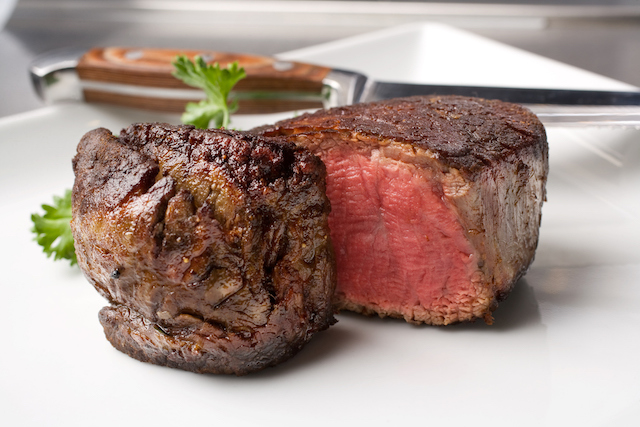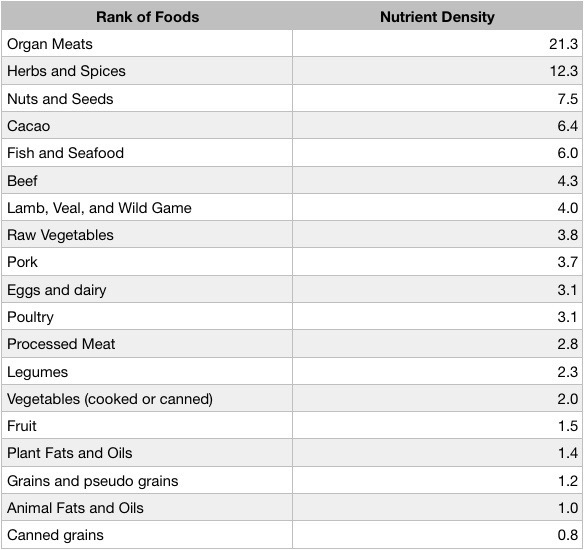Why Does Beef Give Me Energy

Are you tired and exhausted? Do you have blood sugar problems? Trouble losing weight? Memory loss and hard to focus? Red meat is one of the most nutrient dense foods on the planet. It provides you with many of the essential nutrients to give your body and mind increased and sustained energy.
In the previous articles I wrote about the myths surrounding red meat. We learned that eating red meat, in fact, doesn't cause high cholesterol orinflammation. In this article, we're going to focus on the health benefits of eating red meat.
Red Meat is loaded with vitamins and minerals
There are certain vitamins, minerals, and amino acids (building blocks of protein) we can only get from our diet. These are called essential nutrients and are vital for our bodies and minds to function well. If you don't get essential nutrients you won't function well and you are putting yourself at risk for a shorter lifespan.
Nutrient density of a type of food is measured in terms of how many essential nutrients are in a weight per serving. Carbohydrates and fats are important for health as well, but with the exception of two fatty acids, they can be provided by the body for a short period of time if dietary intake is lacking.
Dr. Mat Lalonde , a Harvard chemist, created a nutrient density scale he presented at the Ancestral Health Symposium in 2012. He used the essential nutrients as accepted by the USDA which included:
- Vitamins: A, choline, B1, B2, B3, B5, B6, B7, B9, B12, C, D, E, and K
- Minerals: calcium, copper, iron, magnesium, manganese, phosphorous, potassium, selenium, and zinc
The following are foods ranked in order of their nutrient density:

Red meat (beef, lamb, and wild game) ranks high on the nutrient density scale. Red meat would have an even higher score if essential amino acids, essential fatty acids, and bioavailability (how well nutrients are absorbed from the food) were included in the data.
Red meat is a great source of protein
A small 3 ounce serving of beef (the size of a bar of soap) can provide a whopping 25-30 grams of protein. Fruits, vegetables, nuts and seeds, are good sources of vitamins and minerals but they are low in protein and the little protein they contain is hard to absorb. One serving (1/2 cup) of cooked legumes (lentils, beans, chickpeas) only provides 7-9 grams of protein. ( 1 )
You might think of needing protein to build muscles, but it's needed for much more than that. Protein is needed:
- for proper growth and repair of tissues, organs, and bones.
- to carry oxygen and nutrients to all parts of your body for energy.
- to make your immune system work properly to fight off sickness and to heal properly
- to make chemicals (hormones and neurotransmitters) so your brain and body can talk to each other properly
- to help you with energy levels and weight loss (see below)
Red meat increases and sustains your energy
When you eat foods that are high in nutrients like red meat it makes you feel more full. These foods also help to keep your blood sugar levels normal and sustain your energy levels for longer periods of time. As a result, you will have to eat less often. Foods made from refined flours (bread, cereal, crackers, pasta) are very low in nutrients but high in calories. Eating low nutrient foods like cereal grains cause your blood sugar levels to rise and fall. This results in a rise and fall in energy levels. You feel hungry a couple of hours later which forces you to eat again. So it promotes higher calorie intake, increased fat storage, and weight gain. Contrary to popular belief, eating healthy saturated fat (i.e red meat) and cholesterol (i.e. eggs) doesn't make you fat, but eating refined flours do.
Nutrients in red meat are absorbed easier by humans
The nutrients in red meat are much easier to absorb when compared to nutrients in cereal grains, nuts and seeds, and legumes. Iron, zinc, and essential fatty acids (EPA and DHA), are good examples of this. ( 2, 3, 4, 5, 6, 7 )
Red meat is healthy for your heart
As discussed in a previous article , there is no association between eating saturated fat (i.e. red meat) and heart disease and there may even be an inverse association in eating saturated fat and strokes (eating saturated fat may decrease the risk of stroke). ( 8, 9 )
As well, low carbohydrate diets (which tend to be high in saturated fat) suggest that not only do they not raise cholesterol levels, but they have many benefits in reducing the risk factors for cardiovascular disease (CV disease). Low-carb diets neither increase nor decrease LDL cholesterol ("bad cholesterol"). Low-carb diets are also associated with significant decreases in body weight as well as improvements in several CV risk factors, including decreases in triglycerides, fasting glucose, blood pressure, body mass index, abdominal circumference, plasma insulin and c-reactive protein, as well as an increase in HDL cholesterol ("good cholesterol"). ( 10 )
The two main causes of high cholesterol (specifically high LDL particle number) and heart disease are:
- Insulin and leptin resistance ( 11, 12, 13 )
- Genetics ( 14 )
If you do have signs of insulin resistance, a low-carb paleo diet as described above could help improve your CV risk factors. Red meat would be an important part of this diet. This type of diet is done for about 60 days and then your blood markers should be rechecked to see if they are better.
1 in 300 to 1 in 500 people have a genetic disorder called familial hypercholesterolemia (diagnosed by the Simon Broome criteria). These people would have to limit their intake of red meat and saturated fat because eating a lot of these foods could further increase their cholesterol and LDL particle number. Instead this type of person should be on a higher carbohydrate diet and cut down on red meat intake and other saturated fats.
Summary
Red meat is a high nutrient dense food that can provide your body and mind with energy for long periods of time. In a future article, I will focus on the main nutrients in red meat and discuss their role in improving your health.
Source: https://drcollins.ca/red-meat-give-you-energy/